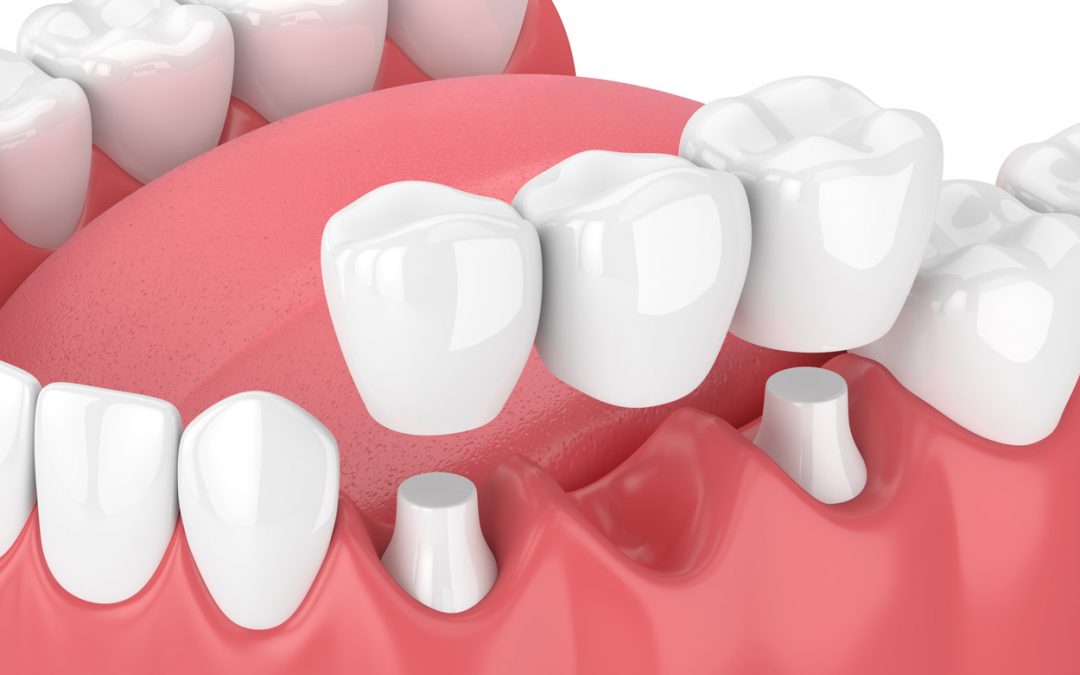One or more missing teeth can adversely affect the appearance and functionality of your smile. Missing teeth can cause a change in occlusion (bite), shifting of the teeth, temporomandibular joint disorder (TMJ), speech impediments, an increased risk for periodontal disease and a greater chance of tooth decay. Dental bridges, like implants and partial dentures, are used to replace missing teeth. Achieving a natural looking and realistic smile after tooth loss is possible with dental bridges. Dental bridges are one method used by dentists to fill a gap created by a missing tooth (or teeth). The negative effects of tooth loss, including an increased risk of periodontal disease and tooth decay, the shifting of teeth, and a change in the bite, can be avoided by the timely placing of dental bridges.
A dental bridge is a type of dental prosthesis which literally bridges the gap between two teeth. If you have lost one or two teeth to decay or because of an accident, a bridge can make your smile complete again.
The main types of Dental Bridge are The Maryland/Resin Bonded Bridge, The cantilever Bridge, The Traditional Bridge and The Implant Supported Bridge. And these bridges depends on the location of the tooth, the condition of the adjacent teeth and your overall oral health.

Cost Of Dental Bridge
1. Maryland/Resin-Bonded Bridge ranges from $1000 to $2300
2. Traditional/Cantilever Bridge ranges from $2250 to $4500
3. Implant Supported Bridge Ranges from $4000 to $16000
Costs are listed on a ‘per unit’ basis, with each abutment (anchor) tooth and each pontic (replacement tooth) counted as a separate unit. For example, a traditional three unit bridge would consist of two abutment teeth on either side of a gap, plus a single pontic in between. The cost of Maryland bridges are based on the number of wings and number of pontics.
*For a Maryland/resin-bonded bridge the price is between $250 and $600 for each wing while each pontic will cost $500 to $1,100.
*For a traditional or cantilever bridge, the average cost is between $750 and $1500 per unit. A typical three-unit bridge would be from $2250 to $4500.
* For an implant supported bridge, the cost depends on the size of the bridge, the materials used and the number of implants required. A typical three or four-unit implant supported bridge can cost from $4,000 to $16,000 (average of $8500).
Factors Affecting The Cost Of Dental Bridges
1. The potential need for additional procedures (such as fillings or root canals) in one or two of the adjoining teeth.
2. The artistic technique of the dentist and lab technician.
3. The location of the dentist.
4. The coverage provided by your dental insurance.
5. The type of material used in the bridge.
6. The preparation of teeth involved in the procedure.
7. The complexity of the placement: Lengthy or more advanced procedures will incur higher costs.
8. Additional treatments: Sometimes dentists will perform other treatments at the same time that he or she places a bridge.
9. Number of units.
10. Dental insurance coverage.
However , the best way to determine the cost of a dental bridge is to consult with a qualified and experienced dentist.
Make an Appointment Today!
NoFrills Dental @ Marina Square
6 Raffles Boulevard,
Marina Square,
#B1-11
Singapore 039594
T: +65 6227 8885
E: marinasquare@nofrillsdental.com.sg
NoFrills Dental @ Suntec City
3 Temasek Boulevard
Suntec City (North Wing)
#03-317
Singapore 038983
Call Us Today
+65 9007 1085


































